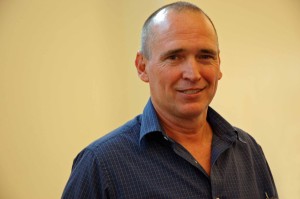FORT COLLINS, CO — “What is digital health,” Jeffrey Nathanson, president and CEO of Prime Health, asked the crowd of startup entrepreneurs, healthcare administrators, and technologists who were gathered at Innosphere for the August 13th Meetup of his statewide digital health organization. Even in a denim shirt and khaki pants, Nathanson’s tall, imposing figure quickly commanded the attention of those in the audience, who sat quietly as he spoke, listening intently to what he had to say.
“There’s a guy on the Internet by the name of Paul Sonnier,” Nathanson continued in a casual tone, “who’s declared, ‘I’ve defined digital health for everyone.” His strong voice filled the room as he strolled past the Prime Health attendees who were seated in the front row. “And we said, ‘okay.”
A ripple of laughter spread throughout the crowd, revealing Nathanson for the consummate public speaker that he was. By displaying his effortless ability to connect with such a diverse and dynamic group, it demonstrated why Nathanson had been chosen to head the digital health organization that had drawn everyone to Innosphere that evening.
“How many of you have a smartphone,” he asked his audience.
Almost all of the attendees raised their hands.
“How many of you have a feature phone?”
Those in the crowd looked around at one another in confusion.
“No one here has a feature phone?”
The audience began to murmur, with one woman whispering, “What is that?”
Finally, someone called out, “What do you mean by a feature phone?”
“A flip phone, without video capacity,” Nathanson explained haltingly, almost at a loss himself to describe the once ubiquitous technology. He paused for a moment, and then with a smile he said, “a dumb phone.”
Once more the audience laughed, yet this time they appeared to be just as entertained by Nathanson’s humor as they were by the collective amnesia that the past decade’s rapid rate of technological advancement seemed to have induced.
“There’s a belief that this is the new healthcare delivery system,” Nathanson went on, referring to the smartphone that he held. “How many times do you check your phone during the day? Three times? Five times? Ten times?” He looked around at the raised hands. “That’s engagement. That’s what we need in healthcare.”
The commonsense appeal of Nathanson’s potentially radical statement again gave the breakneck momentum of technological progress a palpable presence in the convention room. And as Nathanson began to share the ways that his organization was attempting to strengthen the digital health ecosystem in Colorado, it became apparent that Prime Health was playing a pivotal role in harnessing that momentum.
“What we’re trying to do is build relationships, build connections, build this digital health ecosystem,” he explained, describing Prime Health’s mission to foster local startups, before mentioning the market segment leaders that Colorado had already produced, including Healthgrades, iTriage, and Welltok. “When I tell people nationally that we have 126 digital health companies in our state, they can’t believe how big we are.”
Nathanson then detailed the process by which his organization was helping Colorado’s digital health companies integrate their products into the healthcare system. He pointed to Prime Health’s upcoming Digital Health Challenge as the perfect example of this process in action. Scheduled to take place during Denver Startup Week, the 2015 Digital Health Challenge will give eight digital health companies the opportunity to pitch their products before a panel of healthcare providers, with the winning companies set to receive pilots fully funded by a grant from the Colorado Health Foundation.
“We think we have an opportunity to create a very robust marketplace,” Nathanson concluded, referring to the efforts of his organization to strengthen and develop Colorado’s digital health ecosystem, “and this is just the beginning.”
Physician Cognition on Making the Right Diagnosis

At the August gathering of Prime Health, Cameron Powell discussed Xebra Pro, a powerful new program his company has created to prevent misdiagnosis in the clinical setting.
“We know that healthcare is broken in many ways,” Cameron Powell, the co-founder and CEO of Physician Cognition, said as he began his whirlwind talk on Xebra Pro, a clinical decision search engine aimed at improving medical diagnosis around the world.
Condensed to five minutes, Powell’s presentation seemed more like a product pitch than anything else, which made sense, given that he was a semi-finalist in the 2015 Digital Health Challenge. Yet even so his talk was fascinating, holding his audience in rapt attention for the short time that he stood before them.
“Our Xebra Pro technology does key calculations that human doctors typically try to do, but Xebra Pro actually does them better,” he declared, calling to mind Vinod Khosla’s recent comments at the Health Innovations Summit. Bold, and at times almost brash, Powell’s style might have distanced his audience, were it not for the intensely personal event that had influenced his development of Xebra Pro.
“Before my mother died in December,” he confessed, “she was for the better part of fifteen years continually in the dark about various complications that she had. When she had a problem like severe abdominal pain, she didn’t need a diagnosis so much as the answer to four basic questions. The first one is, ‘What do I have?’
“Well, to answer this you can go online and use a symptom checker.” He showed a slide featuring a list of popular symptom checkers, along with the stats regarding their respective accuracies. “But the British medical journal just tested twenty-three of them, and the results were not pretty. The very best of them were wrong half the time.”
Like eighty percent of users, Powell’s mother went online and found that most symptom checkers were inaccurate. Compounding the inefficiency of these programs was the fact that none of them could tell her who she should consult, or what tests she might require.
“So then my mother went to a doctor. She knew what was going on. She was a relatively intelligent person. She told the doctor, ‘Look, I know what gas feels like, and I went through menopause years ago. These are not helpful diagnoses.” Powell appeared to shrug, and then he shook his head before admitting, “In my mother’s case, I think the symptom checkers actually outperformed the doctors.”
He then detailed the clinical decision search engine that his team of developers had built. According to Powell, when he tested Xebra Pro by inputting the same cases that the British Medical Journal had used to evaluate the most popular online symptom checkers, he found that his system far outperformed its competitors, achieving a 93% accuracy rate.
“And the thing our system does that nobody else on the planet can do is learn and improve its results,” he explained. “In minutes, our system will never make the same mistake again, and everyone around the world will have access to that result.”
Powell concluded his pitch by describing the enormously positive response that Xebra Pro was receiving, revealing that medical schools, nursing programs, and patient advocacy groups were already eagerly adopting the system.
“The local branch of the American Diabetes Association recently informed us that thirty percent of all diabetes cases are misdiagnosed,” Powell told his audience in parting. “We can bring that number down to single digits.”
Incendant on Finding the Right Problem to Solve

Dr. Shaun Gogarty of Incendant shared how digital health companies can use pilots to search the healthcare system for profitable problems to solve.
“I’m part of the 3.5 trillion dollar disaster,” Dr. Shaun Gogarty, the CEO of Incendant, said as he began his presentation, referring to the projected size of US healthcare expenditures for 2015. “I helped spend that.” An ER physician and a long-time member of Prime Health, Gogarty had been invited to speak on how pilots could be used to identify the most profitable ways for startups to integrate their digital health products into the healthcare system.
“Like most businesses, ours started with a personal problem. For me as a physician, that personal problem was basically communicating with patients.” Gogarty addressed the members of Prime Health with the friendly bedside manner of an experienced physician, which helped to offset the stark realities of the American healthcare system that peppered his presentation. “I’m not atypical. I even had a background in education. But in spite of that I did a poor job of explaining things to patients. Most doctors do.”
“Fortunately, the solution did not require rehab or any sort of brute therapy,” Gogarty reassured his audience. Then he described the exploratory phase that his company had gone through when first developing its product. “It seemed like a good solution to take what I was saying, put it in an easy to understand video, and put that in the hands of the patient. But good solutions in healthcare don’t always result in good business.”
According to Dr. Gogarty, patients appreciated Incendant, claiming that its videos made their conditions easier to understand. Nurses considered it an effective aid in their efforts to educate. And even physicians saw the value of Gogarty’s product. But none of these parties had purchasing power in the healthcare system.
“There was no question that patients benefitted from the videos. But we had to show that Incendant could get them to change their behaviors.” Gogarty then detailed how he and his team had analyzed the hospitals in which Incendant had been implemented, searching for evidence of its ability to influence patient behavior. “We were finally able to show that we could reduce re-admissions by 25% in a six-month period. Now the hospitals are listening. Reduce re-admissions? That’s something they’ll pay for.”
Gogarty stressed more than once during his presentation that any digital health company with a viable product could get a pilot in a host institution. For most, doing so would only require a connection within the system, like a nurse, a physician, or an administrator. In Gogarty’s opinion, the true challenge wasn’t in obtaining a pilot, but rather in using that pilot to search the healthcare system for the most profitable problems a digital health product could address.
“We had some success, and so other places within the system started calling us. Then other places, and on and on, because everything’s broken,” Gogarty’s constant smile and folksy manner helped to soften the impact of statements like this. “Now keep in mind that any place that’s broken represents an opportunity. That’s why there’s so much interest in digital health. But you have to be very careful that you provide the help they need while making sure that your business works.”
A Force to be Reckoned With
More than any previous gathering, the Meetup at Innosphere testified to the efforts of Prime Health to create a vibrant, dynamic, and formidable digital health ecosystem in Colorado. From revelatory pitches regarding cutting edge diagnostic tools, to hard-earned lessons about navigating the healthcare system, August’s Prime Health Meetup demonstrated that within the realm of digital health, Colorado is becoming a force to be reckoned with.
Have you added Prime Health’s 2015 Digital Health Challenge to your Denver Startup Week schedule? If not, do so here, and reserve your seat for the biggest event in Colorado digital health this year!





Be the first to comment on "How Prime Health is Harnessing the Momentum of The Digital Health Boom in Colorado"